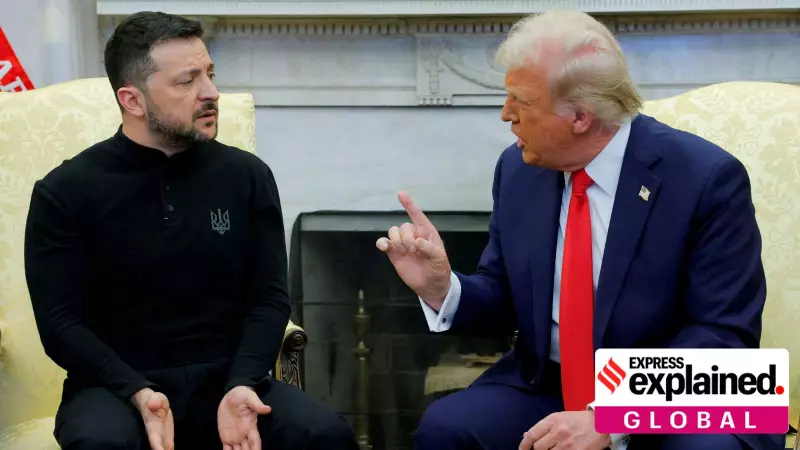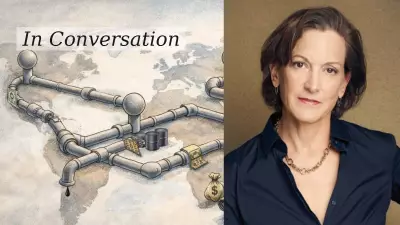
Trump's Controversial Peace Plan Faces Ukrainian Resistance
US President Donald Trump is applying significant pressure on Ukraine to accept within days a new 28-point peace agreement that multiple experts assert heavily favors Russian interests. The proposed deal, jointly drafted by Moscow and Washington, has been described by Russian President Vladimir Putin as potentially forming "the basis of a final peace settlement" to conclude the ongoing conflict. However, for Kyiv and European allies, the agreement crosses several fundamental boundaries that Ukraine has long considered non-negotiable.
Ukrainian President Volodymyr Zelenskyy has maintained a defiant stance against what his administration views as a capitulation to Moscow's demands. Despite intense American pressure, Ukraine appears unlikely to acquiesce easily to terms that many analysts describe as disproportionately beneficial to Russia.
Territorial Concessions Legitimize Russian Gains
The peace plan's most contentious elements revolve around territorial concessions that would effectively recognize Russian control over approximately one-fifth of Ukrainian territory. Clause 21(a) explicitly states that Crimea, Luhansk, and Donetsk will be recognized as de facto Russian territories, including by the United States government.
While this falls short of Moscow's longstanding demand for de jure recognition, it represents a significant victory for Russia by legitimizing territorial acquisitions made during military conflict. Kyiv has consistently resisted even de facto acknowledgment of Russian control over regions Ukraine considers sovereign territory.
The situation becomes more problematic with clause 21(d), which mandates that Ukrainian forces withdraw from currently controlled portions of Donetsk Oblast. This area would then become a neutral demilitarized buffer zone internationally recognized as Russian territory, though Russian forces would not enter this zone.
This provision represents what the Financial Times describes as "the brightest of all red lines" for Ukrainian leadership. Donetsk, located in Ukraine's eastern Donbas region, has been central to Russian strategic interests since the conflict began in 2022. The mineral-rich industrial zone with substantial ethnic Russian population holds both economic and strategic importance for Ukraine, with Kyiv viewing control over Donetsk as potentially existential.
Ukrainian officials express deep skepticism about Russian adherence to demilitarized zones and fear that control over Donetsk would provide Moscow with a strategic springboard for future offensive operations. Notably, after three years of combat, Russia has occupied approximately 75% of Donetsk oblast according to Institute for the Study of War analyses. Clause 21(d) effectively requires Ukraine to cede unoccupied territory to Moscow, a decision that would prove militarily and economically damaging for Kyiv and politically disastrous for President Zelenskyy.
Vague Security Guarantees Undermine Ukrainian Sovereignty
The proposed agreement provides notably ambiguous security assurances for Ukraine, falling substantially short of concrete protection commitments. This represents a critical concern given that security guarantees fundamentally underpin the conflict's origins, with Ukraine seeking NATO membership as deterrence against Russian aggression while Moscow considers such expansion an existential threat.
Clause 3 states that "Russia will not invade neighboring countries and NATO will not expand further", while clause 5 mentions that "Ukraine will receive reliable security guarantees". However, the document lacks specific details regarding what American security guarantees would entail or how they would be enforced.
The security provisions become particularly concerning when read alongside other clauses. Clause 7 requires Ukraine to constitutionally enshrine its non-accession to NATO, while NATO must incorporate provisions excluding Ukrainian membership in its statutes. Additional restrictions include clause 6, which caps Ukrainian armed forces at 600,000 troops, and clause 8, prohibiting NATO from stationing aircraft in Ukraine.
This comprehensive package effectively concedes to Moscow's primary security demands while offering Ukraine limited protection in return. As one Kyiv resident told The New York Times, "For Ukraine, this is a question of 'to be or not to be.' It is better to die standing than to die later as a slave."
Dangerous Precedent for Future Conflicts
The proposed agreement establishes concerning precedents that could influence future international conflicts and accountability for wartime actions. Clause 26 mandates that all parties receive full amnesty for actions during the war and agree not to pursue future claims or complaints.
For Ukraine, which has accused Russian forces and leadership of numerous war crimes, this provision represents another fundamental red line. Granting blanket immunity for actions during the conflict could establish a dangerous template where aggressive nations face no legal consequences for violations of international law.
Ukrainian officials express broader concerns about the agreement's implications for future Russian aggression. By acquiescing to territorial demands and providing immunity for invasion actions, critics argue the White House would effectively enable future Russian expansionism.
The agreement's primary deterrent against Russian violation appears economic. Clause 13 outlines Russia's reintegration into the global economy through sanction relief, while clause 27 indicates that violations would trigger sanction reinstatement. However, given the limited effectiveness of sanctions in deterring Russian military operations over the past three years, Ukrainian officials remain skeptical about this mechanism's reliability.
In a solemn address from Kyiv last Friday, President Zelenskyy described Ukraine's impossible dilemma. Rejecting the plan would preserve national dignity but risk alienating America, Ukraine's crucial ally in a conflict where victory appears increasingly unlikely. Accepting the agreement could mean sacrificing fundamental principles and sovereignty.
"Now the pressure on Ukraine is one of the heaviest," Zelenskyy stated as the nation prepares for an "extremely difficult winter". He emphasized that agreeing to the US-Russia proposal could leave Ukraine "without freedom, dignity and justice" and require trusting "someone who has already attacked us twice."
The Ukrainian president vowed never to sacrifice national interests or violate the constitution, declaring "We did not betray Ukraine then [in 2022], and we will not do so now." As diplomatic pressure intensifies, the world watches whether Ukraine can withstand American and Russian demands or will ultimately confront the reality of military and diplomatic defeat.




